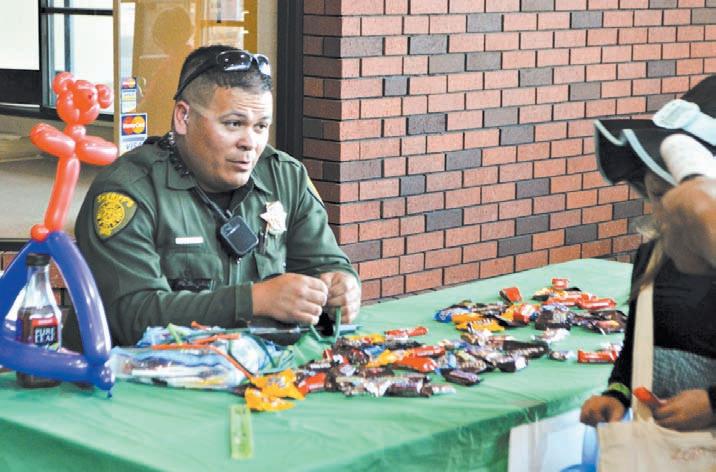
8 minute read
NEWS
from Oct. 31, 2019
BREKHUS BANISHED
It’s no secret that Reno City Councilmember Jenny Brekhus is generally disliked by her colleagues. She asks pointed questions, is a frequently lone nay vote—particularly against development projects— and has strained relations at city hall.
Advertisement
That apparently came to a head earlier this year when City Manager Sabra Newby announced to city staff that Brekhus was no longer going to be allowed to attend agenda briefings with staff. Newby cited what she called Brekhus’ “combative nature” that could lead to a “hostile work environment claim.”
Brekhus, according to Newby, generated concerns by city employees.
“As City Manager, it is my responsibility to provide a positive work environment for all employees. Many employees had expressed concerns about her treatment of staff,” Newby said through a spokesperson. “Having been in attendance at the agenda briefings referenced, I observed the treatment first-hand. To prevent escalation of the situation, in February, I notified Councilmember Brekhus of these concerns hoping the situation would improve. When it did not, I took further action.”
Newby refused to say what those concerns were. She did not respond to requests for an interview. Instead, she issued a statement through the city’s public information officer, who also did not respond to questions about what, exactly, the concerns were.
Brekhus, for her part, said the move by Newby was politics at play.
“After the city manager let me know that she was limiting my access to staff in advance of the council meetings, I objected to her decision at our next regularly scheduled one-on-one meeting,” Brekhus explained. “I told her that she made charged allegations and inquired if there was any documentation to her charges because the city has reporting protocols in place for such allegations. She stated that none existed.”
Brekhus recently announced her re-election campaign. A chief opponent, Britton Griffith, also announced her campaign to challenge Brekhus for her seat.
Griffith quickly received an endorsement from Mayor Hillary Schieve, who has frequent public skirmishes with Brekhus.
Brekhus called the precedent by Newby suspect.
“I told her that in my view she should consult the city manager code of ethics,” Brekhus said. “I expressed concern that she was not following the code because it requires equal treatment of all members of a governing body as related to sharing of information and access to facts. I also felt that she should review the section that limits political activities, because she may well be advancing the political goals of other members of the body.”
Brekhus’ banishment from agenda briefings was first reported on social media by KRNV’s Joe Hart.
Commenters quickly rushed in to support the incumbent councilmember.
One commenter wrote: “Newby was a terrible choice and has exhibited toxic behaviors. Jenny Brekhus asks the right questions, and anyone with eyes and ears who watches Council meetings can see how she has been treated by colleagues. I’m not buying this. Newby should go.” The Washoe County Sheriff’s Office held a community resource fair on Oct. 24 at Reno Town Mall.
PHOTO/JERI DAVIS
Protect and serve
On Oct. 24, the Washoe County Sheriff’s Office hosted a trick-or-treat and community resource fair at the Reno Town Mall, with more than 50 organizations represented at booths where kids could get candy and their parents could get information about resources to help them meet their families’ health, financial and educational needs.
Organizations at the resource fair ranged from Health Plan of Nevada to Veterans Resource Centers of America and the Food Bank of Northern Nevada to Truckee Meadows Community College. The event was organized largely by the Detention Services Unit at the sheriff’s office, a new unit created in April for the purpose of helping community members—both inside and outside of the county jail—access such resources.
“Our focus certainly, through the Detention Services Unit, is programs to enhance and increase services to the inmates in our jail,” said Jeff Clark, chief deputy of the sheriff’s office Detention Bureau. But anytime you have a jail, ultimately, the demographics in your jail are … almost exactly the same as your community. … So, we can identify a lot of needs that not only inmates can use when they’re released. But there’s a lot of people in the community that maybe aren’t at that level of committing a crime to further a drug habit or nuisance crime or something else. … So if we can provide them those same resources before they get into jail, then it’s just as helpful.”
According to Lieutenant Janit Bailey, who oversees the Detention Services Unit, the resource fairs—the next of which will be held in the spring—can also be helpful for the families of inmates.
“If the families have resources and get the support they need, they then can, in turn, be a strong foundation for their loved one when they come back out,” she said. “So it’s really a wrap-around service for everyone—not just inmates.”
The community resource fairs represent the public-facing side of the Detention Services Unit’s work, but, behind the doors of the county jail, its member officers are busy devising and administering myriad programs for the inmates.
INSIDE STORY
“Anytime we identify a need within the jail, it’s [Bailey] and her team that either come up with the idea or take one of our ideas and makes it happen,” said Clark. “And, you know, Sheriff Balaam deserves a lot of credit with this— because, since his election in January, he has given the ultimate support of creating the detention services unit, and he truly wants to help the community.”
“Some of it’s brainstorming from my team,” Bailey said. “Other times it’s our partnerships with people in the community who’ve seen a need—talking to the inmates, talking to families. When we do the resource fairs … talking to people who are in attendance and their concerns about what their family members or friends might need.”
Bailey’s team works with inmates to build individual plans to help them meet their needs and goals, both while they’re in jail and after they’ve been released. These plans generally start with a written request for assistance from an inmate, followed by an interview.
“Based on that interview, then we lay out a plan,” Bailey said. “So, we know if it’s mental health, we can connect them with the mental health care advisers. … If they need housing, we can reach out to providers in the community. … If they need to get into … an addiction program, we can start those programs here, in-house, and then transition them out when they get released. So, it’s that continuity of care. A lot of times people want assistance, but they don’t know where to [start].”
The Detention Services Unit doesn’t just connect inmates with community resources. It also brings members of the community—and their ideas—into the jail in the form of classes. Inmates can take parenting classes, domestic violence prevention classes and classes to help them obtain their diplomas, among others.
One class, administered through Truckee Meadows Community College is called “Getting Ahead Before Getting Out.”
“The student inmates apply for it,” said Public Information Officer Bob Harmon. “It’s taught by a TMCC instructor, and that class is all about, ‘OK, I’m about to get back out. I have to now come up with a plan. How am I going to finance myself? How am I going to juggle my living expenses, my work, my career goals?’”
There’s also a criminal justice class called “Inside Out” that’s taught in conjunction with the University of Nevada, Reno.
“So, it’s half students from UNR, and it’s half students from our inmate population,” Harmon said. “And they meet once a week in the jail together, so you have the inmates and students. So you’re learning about the criminal justice system, particularly for the UNR students, from people who are in the midst of it. The inmates have to write an essay to get into the class, and then they’re responsible for doing all of the homework and the readings.”
At the end of the course, the classmates work together to write a proposal paper on ways to improve the justice system. According to Bailey, Harmon and Clark, the sheriff’s office is open to trying any number of classes, which, for a time, included weekend yoga classes.
“We’re creative and open,” Bailey said. “I mean, most people probably wouldn’t realize that we were doing yoga.”
“The thing that got me about yoga is— because it was a connection I didn’t make until I saw the class, because I don’t do yoga—but in yoga there’s a lot of self reflection and self empowerment,” Harmon said. “And you’re dealing with a population that often has been given very little empowerment during their lives. There’s been very little encouragement, very little respect. I realized when I sat in on a yoga class how important that was for the ladies to have someone actually telling them, ‘You are strong. You have strength.’”
“It’s no longer just an institutional approach to providing programs and assistance,” Bailey added. “It’s more holistic. … It’s not a onesize-fits-all-type-mentality anymore. We’re very geared toward individual needs—because everyone is different. … Their backgrounds are different, the way the process, their needs.”
According to Clark, the new approach is actually a part of a national trend.
“We certainly feel that we’re certainly one of the leaders, nationally speaking,” he said. “But this is something that’s happening across the country. And law enforcement is changing into more of a service-oriented field. And a lot of that is because that’s what society is dictating. With everything that’s going on on a national level, law enforcement is having to change based on community needs. Communities are wanting more from their law enforcement. … We do have to be the ones who are out there trying to find resources for people. … We want this to be viewed as a place of hope, where people know that if they’re at the sheriff’s office they can find the help they need. And we do that whether they come in the front, or if they come in the back door as an arrestee.” Ω
Party animals













